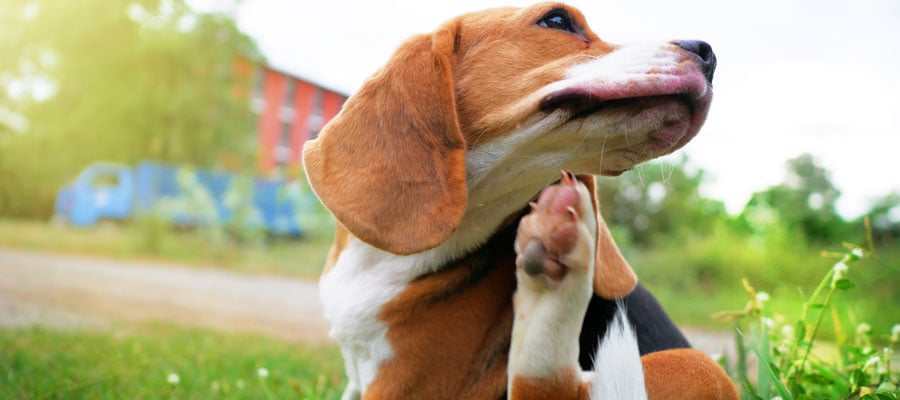Just like humans shed hair, dogs shed their fur throughout their lives, even hypoallergenic dogs. Shedding is a good thing; it’s a dog’s way of getting rid of old and damaged hair. It can be overwhelming in the springtime when some dogs “blow” their winter coat, but overall most dogs lose their fur evenly over their body.
When shedding becomes very centralized in one or more specific areas it is important to get to the root cause because it could be something simple and benign, or it could be something that requires medical treatment. There could be several reasons why your dog might develop alopecia, and we will go over some of the most common possible causes.
Allergies
Your pup could be having environmental or food allergies. Dogs can suffer from seasonal and environmental allergies, triggered by things like pollen, grasses, and dust. There are blood tests available to determine which environmental factors might be triggering an allergic reaction in your pooch. Common food allergens include beef, chicken, and wheat. The best way to determine what ingredients your pup might be allergic to is to eliminate specific foods from their diet for a period of one to two months. Talk to your veterinarian about pet foods they suggest and the best way to go about starting an elimination food trial.
The most common allergy a dog will suffer from is flea bites, also known as flea allergy dermatitis. Canines get an allergic reaction to a flea’s saliva than can cause itching for several days. Fleas and flea dirt (black flakes) are visible to the human eye, so it’s relatively easy to determine if your pet has them. If you find evidence your pet has fleas, take them to your veterinarian to find out the best methods to remove the fleas, and options for future prevention.
Cushing’s Syndrome
When your dog feels stress, their body releases the hormone cortisol to help deal with that stress. Cortisol is a chemical that controls weight, fights off infections, regulates blood sugar levels, and allows a body to physically deal with stress. Cushing’s syndrome, also known as hyperadrenocorticism, happens when the body produces too much cortisol. It can be difficult to diagnose Cushing’s syndrome partly because the symptoms can be similar to other medical issues. If you suspect your dog may have Cushing’s, please talk to your veterinarian so they can run tests.
Genetics
Yes, just like male pattern baldness is inherited in humans, it can be inherited in dogs and cats too. Breeds such as greyhounds, chihuahuas, whippets, and a few other breeds have a better chance of going bald around their ears, chest, thighs, neck, and belly over other breeds.
Infections or Mites
Mange mites, ringworm, and bacterial infections can lead to hair loss. Mite-caused hair loss is usually around the eyes, ears, and mouth, while a ringworm infection can cause hair loss on any part of the body. These kinds of infections are contagious, so getting them treated by your veterinarian should be a high priority.
Pressure Sores
As heavier dogs get older, pressure sores can start to develop on elbows and other bony parts of the body that come into contact with hard surfaces on a regular basis. These pressure sores cause hair to fall out, and the skin to thicken—which causes calluses to form. Those calluses can dry out, crack, and bleed. This is where infections can happen, so make sure you keep an eye out for pressure sores.
Other reasons: Foreign body reaction, post-clipping alopecia, or hypothyroidism.
Yes, there are many other that could be causing your dog to lose hair in one or more spots. It could be completely natural, or it could be something to be concerned about. Here is when you should be getting your dog in to see his veterinarian:
- Excessive itching
- Bad odor coming from the balding spot
- Noticeably irritated or infected skin
- Changes in behavior
- Change in eating or drinking
- Increased shedding, especially during summer or winter
The reason behind your pooch parting with her hair may be as simple as heredity, or as complicated as Cushing’s syndrome. We urge you to stay away from Dr. Google and talk with your dog’s veterinarian directly.
